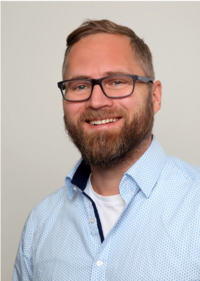
Thomas is the product manager of the Axio Observer for Life Sciences at Carl Zeiss Microscopy.
He started his scientific career as diploma biochemist in Hannover having no motivation to apply for a job in industry. After my diploma thesis he still worked as a research assistant in the lab for a few months before he started his PhD at the IMPRS in Dresden. Through the topic of his doctoral thesis he was lucky to establish a collaboration with a small company called Cenix Biosciences, which over the duration of the collaboration, greatly changed his view of the way people work in industry and the attractiveness of working within a company. After finishing his PhD, he applied for academic as well as industry positions which finally resulted in a postdoctoral position at the MPI for Biophysical Chemistry in Goettingen. After a few years of being a postdoc, he began applying to Carl Zeiss and established first connections and networks. After 6 months, he got a position as an application specialist in the Advanced Development division which resulted 5 years later into his current position as product manager. As a product manager, you work at an interface between management, development, marketing, service and customers. Visiting his talk, you can learn more about his job profile and the difference between research in academia and industry.
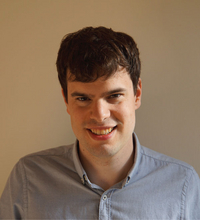
Mate is from Budapest, Hungary, where he studied biology at the Eotvos Lorand University. Following a year in Vienna at MFPL for his Master’s project, he pursued his PhD at the Max Planck Institute of Molecular Cell Biology and Genetics, Dresden, in the lab of Nadine Vastenhouw.
Mate works as a Community Manager for preLights, a preprint highlighting service that was launched over a year ago by The Company of Biologists (a publisher based in Cambridge, UK). His main tasks involve building a community of early-career researchers around preLights, providing them with support, and evolving and promoting this new initiative.
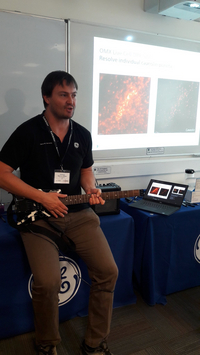
Dan is trained as a bioinorganic chemist, molecular biologist and structural biologist. He developed his interests in computational biology and bioinformatics during several postdocs in UK, USA and Finland, and that lead him into microscopy image analysis and then also microscopy itself. He worked at MPI-CBG for 6 years in the LMF / IPF as a specialist in image analysis and live cell, SPIM, and super resolution microscopy, and developed teaching and presenting skills. Next he became an applications scientist for microscopy and image analysis with GE healthcare where he uses all his experience to help scientists get better more useful results, more easily.
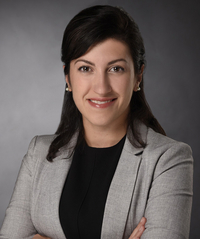
Ayşe Güven studied Molecular Biology and Genetics in Turkey and moved to Dresden in 2012 for her PhD studies. During her time in Dresden, she studied evolution and development of the mammalian brain and obtained her PhD from MPI-CBG in 2016. After spending a long time in basic research, she joined Alcimed as a business and innovation consultant and she is currently based in Cologne.
In her role at Alcimed, she is providing external support to projects spanning whole product value chain of various companies from biotech, pharmaceutical, and healthcare industries. Her clients include decision makers from Roche, Merck, Bayer, Siemens Healthineers, as well as others.
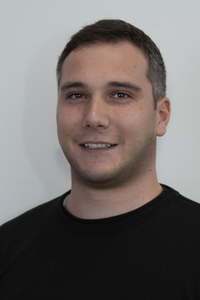
Christoph studied Physics at TU Dresden. Following his diploma, he investigated membranes, membrane-polymer interactions and diffusion in the group of Petra Schwille during his PhD and postdoc time at BIOTEC and the MPI of Biochemistry, respectively.
In 2013, he joined the research group of Jochen Guck with the aim to commercialize the then newly developed real-time deformability cytometry.
As a result, Christoph became a co-founder and employee of Zellmechanik Dresden in 2015 and – as one might expect in a start-up financed by a bootstrapping approach – he faces a broad variety of daily tasks ranging from technical development and research, business strategy and customer relations to dry bureaucracy – not necessarily in that order.
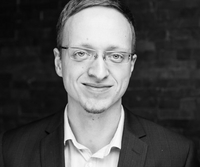
Stefan Frank studied Molecular Biomedicine at the University of Bonn, Germany from 2005 to 2010. Already back then, he became fascinated by human pluripotent stem cells (hPSCs)and their potential to model human diseases in vitro and perfomed his diploma thesis work on this topic in the lab of Prof. Oliver Brüstle. After that, Stefan moved to the Max-Planck-Institute for Molecular Biomedicine in Münster to conduct his PhD studies in the labs of Prof. Hans Schöler and Dr. Boris Greber. Also here, hPSCs were in focus, however this time for modeling cardiac diseases. During this time, Stefan developed his 2nd scientific passion - genome engineering - and worked with both TALENs and CRISPR/Cas9. After obtaining his PhD, Stefan moved to Cologne to perform his postdoc research in the field of long non-coding RNAs in human cardiac development in the lab of Dr. Leo Kurian. Since 2017, Stefan is a lab head in pharmaceutical R&D at Bayer AG in Wuppertal, Germany and is responsible for hPSC-based identification and validation of novel targets to treat cardiovascular diseases.
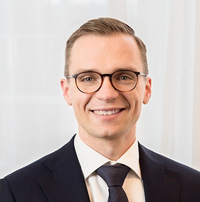
Marc Ehrlich studied Biochemistry and Molecular Medicine at the Ruhr University Bochum, Germany. From 2012 to 2016, Marc did his PhD studies at the Max-Planck Insitute for Molecular Biomedicine in Münster, in the lab of Prof. Hans Schöler and at the Institute of Neuropathology of the University Hospital Münster, in the lab of Prof. Tanja Kuhlmann. Here, he focused on human induced pluripotent stem cells for disease modelling and pre-clinical drug discovery in the field of neurodegenerative diseases. Based on his findings during his PhD, Marc received a group leader grant from the state of North Rhine Westphalia to establish a university spin-off for pre-clinical drug discovery, which resulted in the foundation of the OliGo Technologies GmbH. Fascinated by the combination of (pre-)clinical research and strategic management, he joined in 2018 the Novartis Pharma GmbH in Nuremberg as Medical Advisor Neuroscience. In this position, he is responsible for clinical trials and medical projects in the indication of migraine.
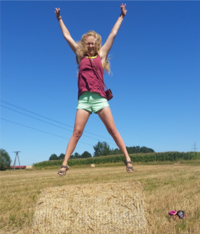
Jump into it & give it a try!
Daria Chrobok just recently finished her PhD in Plant Physiology. She is currently working part-time for Physiologia Plantarum, a society owned journal within the Scandinavian Plant Physiology Society. She is aiming to become a Scientific Illustrator, so at the same time she is working to establish her Company DC SciArt. Her focus are not only strictly scientific illustrations, but she also loves to make scientific comics to loosen up a bit the “stiff” and “serious” image that Science has and engage even non-scientists into different types of topics.